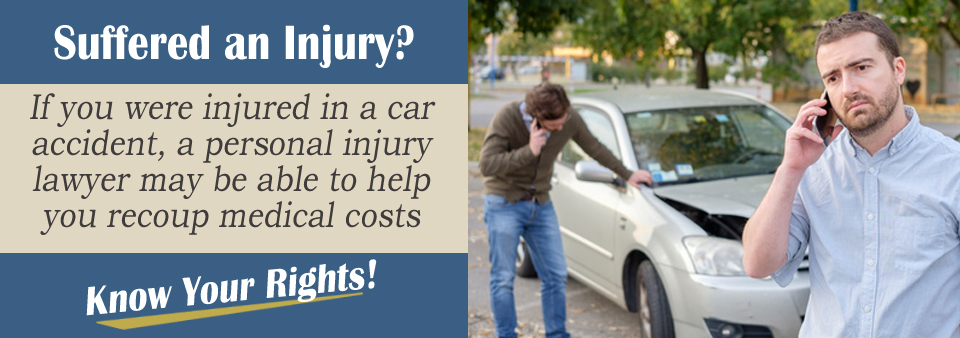Car accidents happen to almost everyone at one point or another and some of them can cause serious injuries. If you were hurt in a car accident you could be eligible to file a personal injury claim. Money awarded for a personal injury claim can pay for medical bills and other expenses that were caused by the accident. Even if you are found to be partially responsible for the accident you can receive money from a personal injury claim.
Talk to an experienced personal injury attorney to find out if the circumstances of your accident qualify you to file a personal injury claim to get money for medical costs and other expenses that were caused by the accident.
Rear-end Auto Accidents
Car accidents, in which a vehicle is rear-ended, may sometimes be cut and dry.
If rear-ended at an intersection, the driver that fails to stop at a safe distance behind you at a stoplight or stop sign is at fault for the accident. Proving this can be fairly simple, if there are witnesses or traffic cameras in the area.
If, however, you fail to maintain safe distance in busy traffic and rear-end the car in front of you, then you’re at fault. Even if the driver in front of you has to quickly hit the brakes for some reason and you hit their car because you were following too closely, then the primary fault will fall to you.
If another car was involved (for example, someone pulls out in front of the vehicle you hit), then determining fault can get complicated. The person driving erratically obviously holds fault in the accident, but other factors can influence the outcome of a personal injury claim.
The other driver may be at fault if they had:
- Failed to watch the road
- Were following other vehicles too closely
- Were speeding
- Failed to apply the brakes within a “reasonable” amount of time

For more information on rear end personal injury claims, please see our page about rear end collisions.
If the Accident Occurs while Making a Left Turn
Accidents commonly occur while making left turns, but fault is influenced by several factors. If the accident occurs at an intersection where left turns are only permitted when the traffic light indicates, a driver that fails to follow the rules of the intersection is at fault. The same is true for a driver that doesn’t heed delayed traffic signals or other rules of the intersection.
If the accident happens away from an intersection instead, one driver may be at fault or multiple drivers may share responsibility. A driver that turns left when oncoming traffic is too close can be liable, but the other driver can also be partially responsible if he or she is:
- Distracted while driving
- Speeding or otherwise driving irresponsibly or erratically
- Failing to brake when doing so is obviously needed
You can find more information on left turn car personal injury claims here: Auto Accidents Caused by a Left Turn.
Auto Accidents Involving Cell Phones
Texting while driving is illegal in many places. A driver that causes an accident while texting is usually held responsible, even in areas where texting and driving is not illegal.
Talking on a cell phone is also illegal in many jurisdictions, but even when it’s not, a driver can still be at fault in a number of circumstances:
- If operating a vehicle with only one hand
- If reaching for a phone and not watching the road
- If distracted from the road while dialing the phone
- If distracted during the course of the conversation
Third-parties can sometimes be held partially responsible in car accidents that involve cell phones. This is especially true when the third party is an employer on the other end of the phone call.
Legal Help For Your Car Accident
If you’ve been in a car accident and the other driver was even partially at fault for the accident, then you may have a personal injury claim. Establishing fault or liability is central in all claims. Showing that the other driver holds primary responsibility is often necessary for you to receive compensation.
The scenarios presented here help you understand how fault or liability is assigned in car accident claims. Consider discussing your accident with an attorney who is familiar with personal injury claims and negotiations for damages.
Your personal injury attorney can:
- Advise you on the strength of your claim
- Help you negotiate a settlement
- Argue your case if a lawsuit must be filed